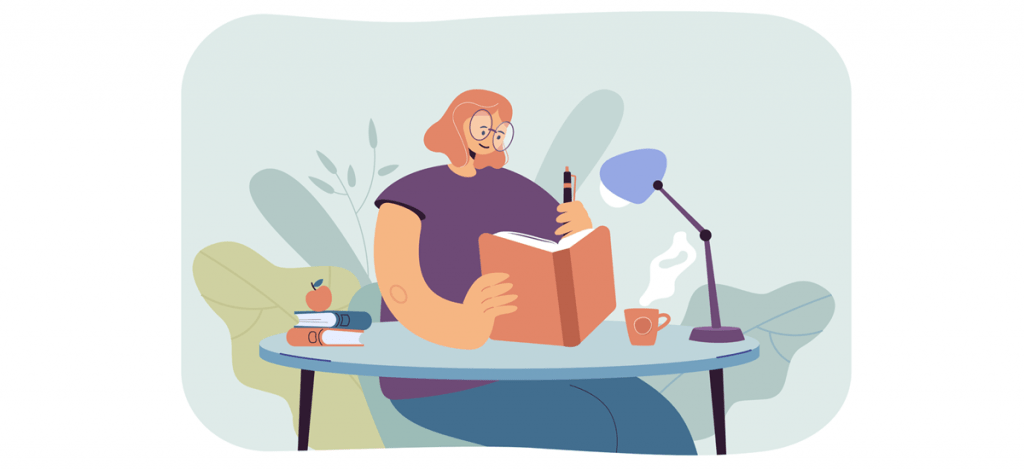Students, book lovers, literature enthusiasts, and aspiring writers, all have something in common – they all keep a book reading journal. You may ask yourself: “what is a reading journal and how can it help me?”.
While some people might think that having a reading journal is a pointless and rather childish practice, only those who’ve read enough books will understand its necessity.
Once you’ve become acquainted with dozens of characters, it’s easy to lose track of some of the plots or mix the stories.
But having a reading journal means you’ll always have an entry that can help you remember exactly what you need to know.
But the difference between the information you find online and the one that you keep in your reading journal is that the latter has your unique thoughts and impression about the book, the characters, and the author.
At first, re-reading an objective perspective about the book you’ve read on the Internet doesn’t seem too inconvenient. But the truth is that we rarely stay objective while we read. Inevitably, we’ll root for some characters or we may strongly disagree with some personal perspective the author is inserting not-always-subtly in the book.
And this is what we are going to remember in the long run – how the book made us feel.
What is a reading journal?
A reading journal is defined as a log made either in the form of traditional pen and paper writing or digitally, where the reading experiences are marked down and described. Reading journals can take many shapes and forms, as they can serve different purposes for each book lover.
While some readers use journaling as a way to track their reading in order to always have a clear image of what they read, others use it as a way to remember book plots and characters’ names. For some, keeping reading journals is an integral part of the reading experience, as they use it to add a level of mindfulness to each session by exploring their own thoughts and feelings in writing.
Reading journals can be a great way for some readers to do short summaries of the books they’ve read, keeping them all in one place. Observations, personal thoughts and opinions, impressions of the author’s style, and interesting information about each book’s plot can all go into a reading journal. The reader can later come back to the things that were written in the journal and relive the experience of reading each particular book.
Give Your Reading Experience
An Extra Boost With Basmo
Track the books you read, monitor the time you spend reading and keep notes on your reading habits and how it makes you feel. You can set yourself targets for the time you spend reading and you can get notified whenever you’re behind on your reading time.
What is the purpose of writing a reading journal?
“A reader lives a thousand lives before he dies”, said George R.R. Martin in one of his novels.
But if you learn how to keep a reading journal, you can write all the impressions and emotions you had while you read a book. After all, that’s what a reading journal is about – reliving all the emotions and the memories a book gave us.
This is not the only advantage you’ll get if you learn how to write a reading journal. Here’s a list with a few more benefits:
1. You’ll Better Memorize the Information In the Books
- “What was his mother’s maiden name?”
- “Where did she run when she was 15?”
- “Why did the author make his characters so sad?”
This avalanche of questions can be answered simply – by writing them down in your journal.
Anytime you need a short and clear answer, you can check your reading diary and find out everything you need to know in an instant. Not only will you have a clear record of all the books you’ve read, you will also have a couple of relevant details at hand at all times.
2. You’ll Learn Faster
Some characters, plot twists, or settings are easy to forget. Especially when the author doesn’t spend too much describing them. That’s why writing down any necessary details as you read will save you a lot of time in the end.
Instead of re-reading a few past chapters until you find the information you need, just open your reading journal and find that answer in just a few seconds.
This way, you can address any question you have during your reading session, refresh your memory, and learn faster what the book is all about.
3. It Improves Your Reading Speed
Knowing that you don’t have to memorize all the names and details in a book can be a great stress reliever when you read.
Having a reading journal and writing down important ideas as soon as you see them gives you a certain freedom similar to skimming. You don’t need to read every word of a long paragraph, especially when the author is focusing too much on describing, let’s say, a bench in the park.
Your reading diary will help you keep track of what’s indeed important and help you skip those boring, unnecessary parts.
4. You Can Track Your Reading Tastes
As you progress with your books, your reading taste changes – and that’s ok. Maybe you’ve started with some simple, short stories and now you’re reading more challenging books. Or maybe you’ve had enough of those pretentious books and now you just want to go with something easy.
Seeing yourself making progress with your reading routine and tracking down your thoughts can inspire you to read even more. Besides, you can evaluate what you should improve about your reading habits, and you can find out tons of new, interesting things about yourself.
5. It Makes Your Revision a Lot Smoother
Keeping a reading diary means that you’re also organizing your thoughts. You don’t just write down random people and cities’ names – you also establish connections between all of these. This way, when you re-read your journal, you’ll remember exactly the important details and how they are related to the whole book.
6. Keeping a reading journal improves critical thinking
By having a book journal and constantly writing in it after each book you read, or even after individual reading sessions, you give yourself a push toward very healthy reading habits. Knowing that everything you read and find interesting will eventually end up as a note in your book journal is going to help you stay focused and more importantly, always try to interpret what you are reading in a personal manner.
Critical and analytical thinking will be constantly coming into play while you are reading, while you’re trying to figure out what needs to go in your reading journal and what not. Since we already know that our brains work in a very similar fashion to our muscles, any type of mental exercise we perform is going to have a positive impact on the way our brains work. Following that trail of logic, keeping a reading journal is going to consequently improve your ability to think critically and analytically.
7. Your writing skills are going to be improved
Being able to write beautiful and easy-to-read content is not a skill that is a reserved requirement for those who earn their living as writers. If you think about it, you’re constantly chatting, IM-ing, writing social media posts, and composing emails as part of your job. Writing is a huge part of who we are and how we present ourselves to the world around us.
That being said, you should always keep in mind that keeping a book journal is going to have a positive impact on the quality and ease of your writing. Writing skills are developed through practice first and foremost, talent has very little to do with it.
If you decide to start a reading journal, one of the benefits you are going to enjoy is the fact that you will constantly write, which will slowly and surely improve how well you do it. Jotting down your thoughts, feelings, and opinions will force you to go through an introspective process, while also pushing your boundaries when it comes to expressing these thoughts in writing. In the end, even your daily emails and social media posts will sound a lot better.
8. Start a reading journal to improve reading comprehension
Keeping a reading journal can help you boost your level of comprehension when reading. Simply knowing that you want to remember and jot down the essential information from a book or reading material will give your reading session a whole new purpose. This will help you focus, will push you to pay more attention to the new concepts and ideas you are unfamiliar with, and give you new motivation.
As soon as you start a reading journal, you will constantly want to go over the things you write, which will help you better solidify your understanding of the things you read. Moreover, having your own reading journal where you summarize the books you read and add your own personal thoughts about them will prove to be a very useful tool whenever you want to make sure you remember things correctly or when you want to go over some concepts again.
9. You can use it as a reading log
Reading journals can be a great way for you to keep track of every single book you read. While there might be some better options for you when it comes to tracking what you read, keeping a reading journal is still something used by many readers out there as a book tracker.
By writing down the title of each book you read, you are going to have a clear idea of how many books you’ve read and you avoid buying the same book twice. On top of this, if you also use the opportunity to write down some details about each book in your log, you’ll have a nice collection of personal memories about each one.
10. Keeping a reading journal gives you a chance to reflect
On top of the fact that it can be used as a very effective book tracker, a reading journal is a great way for you to reflect and explore your thoughts, emotions, and personal impressions about the things you are reading.
Whether you use your reading journal as an opportunity to reflect on your own self-development by looking back at the things you were reading and the thoughts you were jotting down years ago or you are using it as a way to reflect and express yourself at the moment about the things you are reading now, the results are going to work wonders for your mindfulness in reading.
Reading Journal Ideas. How to keep a reading journal.
Just start by thinking about what you want to write in your reading diary. Making a template and sticking to that for every book you start is a great idea. On the other hand, every book is different, so you can choose something different every time you log into your reading journal.
You won’t write about your personal life or your day, that’s true. But a reading journal still feels like a journal. Expressing your opinions or re-writing some ideas in your own words still counts as an intimate routine. So here are a few examples of what other book lovers write about in their reading journals.
1. Free Flow Write While You Read
Free-flow writing must be one of the most relaxing and pleasant ways to write in your reading journal. There’s something that a character reminds you of? Write it down. Do you like how the author said something? Write it down. Have you found a quote that inspires you? You guessed it again – write it down.
As a side note (pun intended) here’s a quick guide about how to take notes efficiently while reading!
2. Write What You Didn’t Like And Why
Not all books are nice and comfortable. Some books will challenge us to see things from a different perspective while others will simply annoy us.
For these moments remember that your reading journal isn’t just for lovely, cute things. You can wholeheartedly disagree with some things and note the frustration or anger the book makes you feel.
3. Write Down the Questions You’re Left with After Reading a Book
Some books leave you with more questions than you had when you started reading them. It’s a good idea to note these questions and address them whenever you want.
4. Note the Quotes You Liked
If you don’t like to go too in-depth like in the case of free-flow writing, you can just keep it simple. Scan the quotes you’ve enjoyed and make a compilation with all of them. You can use them to motivate you to read more or inspire you in your daily life.
With Basmo, you can do this in just a few seconds:
- Open Basmo.
- Start your reading session.
- Right at the bottom of your screen, there is a Scan page button.
- Tap on it and record all the pages you want.
5. Create a Grading System to Rank Your Books
No rule says you have to read books you don’t like. Thus, creating a grading system will help you choose future books based on the ones you currently like.
After you finish your book, make a habit of rating that book. This way, you can find recommendations easier and build an exciting to-be-read books list that you’re looking forward to.
6. Make a Simple List with the Name of the Author and the Title of the Book
Having a reading journal where you list only the author’s name and the book’s title is more than enough. It’s a great idea to track all the books you’re reading, and see how your reading habit has improved so far.
7. Keep a Collection with the Pages You Liked
If you want to enjoy the perks of a digital reading journal to the fullest, you can also screenshot the pages you liked the most and make a collection with all of them.
There will be times when you’ll want to re-read your favorite books, but you won’t find the necessary time to do it.
In other words, instead of spending time re-reading the whole book just to reach the moments you liked the most, you can check your reading journal and read only those parts!
8. Make connections in your reading journal entries
The truly beautiful thing about book journals is that you get to be as free as you could possibly be. There is nothing stopping you from approaching your journal from any perspective you can think of. You can read about a dozen reading journal ideas and choose your favorite one, or you can simply create your own structure and format.
One important thing to remember is that you are going to enjoy the experience a lot more and you will have a lot more to gain if you use the journal as an opportunity to make important connections. What this means is that you should always think of the things you read and put them in perspective, in relation to any other piece of information that seems relevant and is already in possession.
If you read a book on a certain topic that simply reminds you of another book you read years ago, write that down. It will be a great exercise for your brain, especially for your memory, and you never know when you’ll need to crossreference some information from more sources.
9. Make predictions
While not many book journal ideas are based on this, making predictions while reading and writing them down in your reading journal can be a great approach to documenting your reading experiences.
After each reading session, you should write down, among other things you find important, what you think is going to happen next in the book you are reading. When you continue reading and find out how the action unfolds, compare it to your notes. How often do you get it right?
This can be a lot more than just a way for you to confirm your ability to accurately predict how things will turn out in certain imaginary situations. Practicing your prediction skills will be a great way for you to exercise your brain and use your imagination. This will eventually lead you to a more outside-the-box thinking and better-developed problem-solving skills.
10. Who said you need to just write?
Regardless of how hard I looked, I couldn’t find any rules of journal keeping that mentioned you couldn’t draw sketches or illustrations to better visualize the experience if that’s your cup of tea. Fun, right? Well, not just fun.
It doesn’t matter how talented you are, drawing will activate parts of the brain that don’t get activated when reading or writing. That means that adding an illustration to the mix will force your brain to use a bigger area to process the information, which will create new neuronal bridges and connections, leading to better comprehension and retention.
That being said, whenever you feel like adding some doodles to your reading journal entries, you shouldn’t think twice about it. Just do it!
11. Compare books to their movie adaptations
One of the more creative reading journal ideas is to use your reading log as a platform for jotting down your thoughts about more than just books. We all know that a lot of books end up being adapted into movies. To be more precise, an average of thirty novels will receive a movie adaptation every single year.
The simple addition of reading books that have movie adaptations and comparing the two in your reading journal can have a massive impact on your reading habits and the whole experience.
Not only that, but if you watch movies based on books you already read and added to your journal in the past, you can easily go back to your entries and compare the way you visualized the action and the characters to the film creators’ vision. That being said, perhaps you should add this strategy to your reading goals. It can make things a lot more fun and interesting.
12. Use your journal entries as a platform to communicate with the authors
Sometimes we connect to the authors of our favorite books on a very deep level despite the fact that more often than not we’re not even living in the same century. You should take advantage of the connection you feel to the author and try using your reading journal as a way to communicate your thoughts and direct them straight toward the writer.
Ask questions in your journal entries, expose your opinions as if you were talking to the author, and try to imagine how a real conversation with the writer would go. This will make your reading experience come alive, will add a whole new level of depth to your emotional response, and will help you be more mindful of your reading. Don’t shy away from criticizing them either.
The social aspect of reading, discussing books, and sharing our opinion with others is very important for readers. Sometimes having an imaginary discussion with the author in writing is going to be a much easier and more effective way to get everything off our chest than joining a book club.
13. Keep track of the new words you’re learning
Vocabulary development is one of the main benefits of reading and one the most common reading goals among readers everywhere. Considering how important it is to have a rich vocabulary, it’s easy to understand why so many of us struggle to continuously learn new words.
Use your reading journal, whether you format it as a diary or simply a bullet journal, to keep track of all the new words you’re learning from books. As soon as you come across a word you were unfamiliar with and discover its meaning, write it down in your bullet journal and even try to use it in a couple of sentences, in writing.
This will considerably increase your chances of remembering new words and adding them to your daily repertoire.
14. Write about the way books impacted your life
Another one of my favorite reading journal ideas for adults is focusing on the impact certain books have on our lives or way of thinking. We all know that sometimes books can give us a completely different perspective on certain topics.
Writing about the impact they have on us is a great way to add more power to the effect they have. Documenting the changes and the influence they generate will make reading a completely different experience. We can later read about the effect a certain book had on our youth and gain a much better understanding of who we are today and why we act a certain way.
We are the result of an infinity of tiny and seemingly insignificant factors, but what you need to understand is that absolutely every single detail of our past has a contribution to our personality today. That being said, the way books impact our lives and our perception of the world is a very important thing to track.
Bottom Line
Starting a reading journal isn’t complicated, or difficult. Most of the time, it’s just a matter of habit. Once you start doing it regularly, you’ll see that taking notes and writing your thoughts down while you read will feel like second nature to you.
In other situations, reading journals can save a lot of time. For example, when the author decides to take a break in between volumes for several months or even years. Reviewing your notes about their previous volumes is so much easier than reading the entire saga again.
One thing to keep in mind is that there is no right or wrong way to journal while you read. Whether you choose to stay loyal to a certain template or you’re experimenting with various styles, the most important thing is to have fun with it!
Start your reading journal today using one of our reading journal ideas and in one year you can revisit your notes. It’s a great way to see how much you’ve grown in just a short time, how well your reading habits have improved, and how many books you’ve managed to read!
Ready to take your reading game to the next level?
Try Basmo book tracker today!
Track your books, take notes, scan your favorite pages, and even gamify reading by comparing your progress with other readers and with reading statistics from all over the world. You can start feeling comfortable with reading again.
Want to give Basmo a try? It’s 1005 FREE, just like TikTok!





